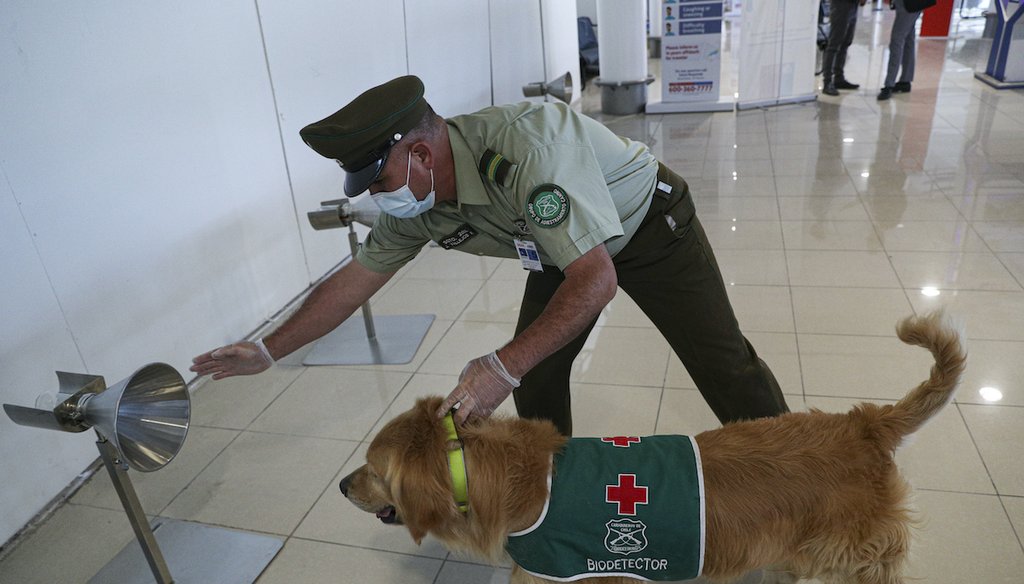Stand up for the facts!
Our only agenda is to publish the truth so you can be an informed participant in democracy.
We need your help.
I would like to contribute

A police handler and his COVID-19 sniffer dog give a demonstration at the Arturo Merino Benítez International Airport in Santiago, Chile, Dec. 21, 2020. (AP)
If Your Time is short
-
Several studies show the promise of sniffer dogs. But they also said it’s important to do more research and that detection dogs can be used as a complement to more reliable testing.
-
In trials around the world, researchers have used sweat, saliva, and urine samples of people with and without COVID-19 to train dogs to identify an infected person.
The NBA’s Miami Heat, like other businesses, is looking at new ways to offer customers a degree of comfort and safety during the coronavirus pandemic. That’s why when it reopens its arena to a limited number of fans Jan. 28, the team’s safety protocols will include an uncommon sight: COVID-19 detection dogs.
Before letting people into the arena, handlers will walk trained dogs and have them sniff around each person. If a dog signals that a person in line has COVID-19, neither that person nor those in his or her group will be allowed to enter. People who are uncomfortable around dogs or allergic to them can choose to do a rapid antigen test instead and get results in less than 45 minutes, the team said.
News of the policy made us wonder: How does a dog's nose really know whether someone has COVID-19? Can a dog get it wrong and keep you away from the game?
The concept might sound odd, but perhaps it shouldn’t come as a total surprise given how certain breeds of dogs help law enforcement and researchers. Police often use specially trained Labrador Retrievers to sniff for narcotics, explosives, and for search and rescue missions. Researchers have trained certain types of dogs to detect some types of cancer.
So when the pandemic hit, researchers wondered if sniffing dogs had a job to do. Several studies show the promise of using sniffer dogs to detect COVID-19. But they also said it’s important to do more research and that sniffer dogs can be used as a complement to more reliable testing.
Dogs are famously good sniffers — they have up to 300 million smell receptors, about 50 times more than do humans.
In trials around the world, researchers have used sweat, saliva, and urine samples of people with and without COVID-19 to train dogs to identify an infected person. But researchers say they don’t know for sure what the dogs are smelling.
"Volatile organic compounds given off in the sweat samples are a complex mix. So it’s likely the dogs are detecting a particular profile rather than individual compounds," Susan Hazel and Anne-Lise Chaber, researchers at the University of Adelaide in Australia wrote in a post published in August by The Conversation. Both are part of an international research team training dogs to sniff out traces of the novel coronavirus, SARS-CoV-2.
Results are promising, but not definitive.
A study from researchers in France and Lebanon tested dogs by using sweat samples from the underarms of people who had been tested for COVID-19. Dogs were trained to inspect a line-up of cones and to identify the cone with a positive COVID-19 sample by sitting in front of it. A trial was considered a "success" if a dog correctly marked the cone that had the COVID-19 sample. The success rate per dog ranged from 76% to 100%.
The study, published in December, said that because some samples were used repeatedly during the testing sessions, it cannot be ruled out that a dog memorized the odor of a COVID-19 positive sample. (Given the results collected, though, the researchers believed that scent memory did not play a major role, if any.)
In another study in Germany, dogs were trained to detect people infected with the novel coronavirus based on the individuals’ saliva or respiratory secretions. Researchers used a special device that had seven scent holes. "For each trial run, only one hole presented a SARS-CoV-2 positive sample at a time while the other six holes presented negative samples," the study said. (Here’s a video of a dog in a trial.)
During the presentation of 1,012 randomized samples, the dogs achieved an overall average detection rate of 94%.
"The current study results are promising, although they should be regarded as preliminary and suitability for this detection method in the field can only be acquired after further research has been conducted," said the study published in July. "Our work provides the very first steps of the development of a new SARS-CoV-2 screening method."
At the University of Pennsylvania, researchers are running a pilot training program in which dogs are exposed to COVID-19 positive saliva and urine samples in a controlled setting. "Once the dogs learn the odor, the investigators will document that the dogs can discriminate between COVID-19 positive and COVID-19 negative samples in a laboratory setting, establishing the platform for testing to determine if the dogs can identify COVID-19 infected people," said a May post on Penn Today.
That study is still under way, Cynthia Otto, a professor of Working Dog Sciences and Sports Medicine at the University of Pennsylvania, told PolitiFact.
COVID-19 detection dogs have been used at a few airports around the world. In Finland’s four-month trial that started in September, passengers aren't inspected by dogs directly. Instead, passengers swipe their skin with a wipe which is then put into a jar and given to a dog to sniff. If a dog signals that the sample is COVID-19 positive, the passenger is urged to take a standard polymerase chain reaction coronavirus test to check the dog’s accuracy, the AP reported.
The Miami Heat said it partnered with a company called SNIFF to design the detection concept and do the research and development. Dogs were trained to identify the scent profile that people with COVID-19 sweat off and learned how to do their jobs in an arena setting.
The team said it decided to incorporate the dog screening process "as an additional layer of protection" on top of other safety protocols, which include physical distancing and a mandatory mask policy.
Certain traits such as intelligence, obedience, and hunting ability in certain breeds of dogs make them suitable for training as detection dogs.
The breeds of dogs used in the studies we reviewed varied. They included German shepherds, Belgian Malinoises, and Jack Russell terriers.
One of the studies noted that it involved dogs that had been trained for other tasks, including search and rescue, explosives detection, or colon cancer detection.
More research is needed to have a better understanding of how COVID-19 affects animals, according to the Centers for Disease Control and Prevention.
Although a small number of animals, including dogs, have been infected with the virus that causes COVID-19, there is no evidence that animals play a significant role in spreading the virus, the CDC said.
In trials where dogs were trained to sniff for COVID-19, researchers said they took safety measures to protect the dogs and their trainers.
Our Sources
Email interview, Lorenzo Butler director of business communication, The HEAT Group Business Communications, Jan. 25, 2021
Email exchange, Cynthia Otto, a professor of Working Dog Sciences and Sports Medicine at the University of Pennsylvania, Jan. 22, 2021
NBA.com, Miami Heat’s COVID-19 screening policy
CDC.gov, COVID-19 and Animals
AP, Finland deploys coronavirus-sniffing dogs at main airport, Sept. 23, 2020
Reuters, Sit, stay, detect COVID! Chile dogs report for duty at Santiago airport, Dec. 23, 2020
Penn Today, Penn Vet launches COVID-19 canine scent detection study, May 1, 2020
The Conversation, These dogs are trained to sniff out the coronavirus. Most have a 100% success rate, Aug. 4, 2020
BMC Infectious Diseases, Scent dog identification of samples from COVID-19 patients – a pilot study, published July 23, 2020
PLOS ONE, Can the detection dog alert on COVID-19 positive persons by sniffing axillary sweat samples? A proof-of-concept study, published Dec. 10, 2020




































